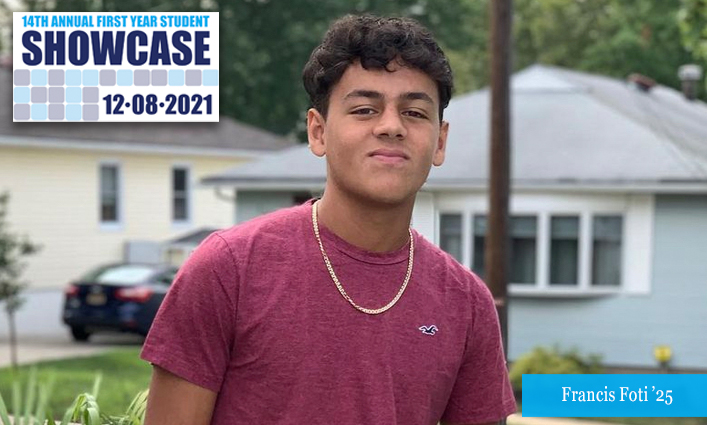
Every year, our First-Year Student Showcase is a highly anticipated event because it features the justice-focused research of our newest John Jay students. The variety of topics covered is wide, the methodology is intriguing, and in many cases, the outcomes are surprising and inspiring. Guided by faculty and staff mentors, along with the unwavering support of Associate Director of First Year Programs, Nancy Yang, this year’s first-year scholars did not disappoint with their recent research presentations. We connected with some of the presenters and dived a little deeper into their theories, their methodologies, and their findings.
Are people born inherently good or bad? Does a person’s environment have a greater power in shaping who they become than their genetics? These are the questions first-year student Francis Foti ’25, a Forensic Accounting major from Staten Island, New York, was hoping to answer during his First-Year Showcase project. Together with his fellow first-year classmates Jacub, Lottie, and Dylan, Foti examined Charles Dickens’s novel Great Expectations and analyzed whether the character of Abel Magwitch, a convicted thief, was a product of a justice system that failed him. “We all had similar interests in the character of Abel Magwitch, and being John Jay students, we wanted to dig deeper into the character’s criminal background and his journey,” says Foti, turning his attention to the author. “Dickens was so ahead of his time. He made sure to highlight the problems in the criminal justice system despite threat of punishment or backlash when publishing his novels. He was a social justice warrior in his own way.” We connected with Foti to learn more about his experience conducting this research.
“We all had similar interests in the character of Abel Magwitch and being John Jay students, we wanted to dig deeper into the character’s criminal background and his journey.” —Francis Foti
What specific methodology did you use to conduct your research?
We acted as a focus group and used both the book and the 1942 film version of Great Expectations to conduct our research. After hours of focus study and using qualitative analysis, we were able to see the corruption within the system and how it ultimately failed the character of Abel Magwitch.
During your research, can you tell us about any specific obstacles or “wins” that were either extremely challenging or rewarding?
At first, our group struggled to get together and begin the project over Zoom. We were all initially nervous around each other, but once we met on campus we got more comfortable. Then the next time we got together to discuss the project over Zoom, we were firing on all cylinders. We brainstormed to create our hypothesis and really supported each other, improving on each idea. I did my best to help lead our group by creating a schedule that worked for everyone and assigning different tasks to specific group members so that the project would be done more efficiently. That was challenging because it meant I worked extra hours sometimes, but I was happy to do it because I wanted our project to be perfect. It was a win-win situation because everyone in the group was really supportive the whole way through and the project ended up being amazing.
When the research concluded, what were some of your conclusions and takeaways?
Our research concluded that the system had indeed failed Abel Magwitch. It was not only his rough around the edges appearance that led to his life of crime, but it was his history of being orphaned and homeless that led him down this path. If he was never abandoned as a young child, he wouldn’t have become a criminal. We saw that the criminal justice system failed him in that he was punished instead of getting him the help he needed.
“Don’t be afraid to step up and lead the way when embarking on your research project. Voice your opinions, be respectful of your group mates, and listen to what they have to say.” —Francis Foti
Knowing what you know now, what would you say to another student about to embark on a research project?
Don’t be afraid to step up and lead the way when embarking on your research project. Voice your opinions, be respectful of your group mates, and listen to what they have to say. Have confidence in yourself but stay humble. Finally, be receptive to opposing opinions and be patient with your group when challenges arise, because through difficulty and struggle comes success.



